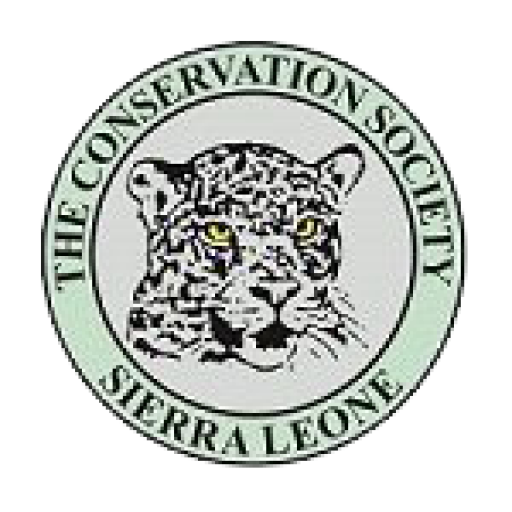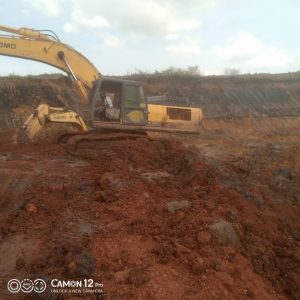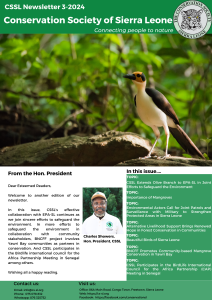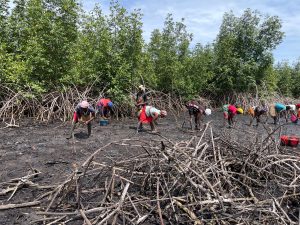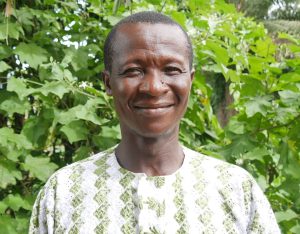 Abdul Borbor Musa is a 45-year-old farmer and lives in Joru community in Gaura chiefdom, Kenema district, eastern Sierra Leone. For a long time, Abdul was involved in logging and slash-and-burn farming in the “Gaya-yei” (the crying hills) community forest in Joru. These were key activities that he heavily depended on as livelihood options for the daily survival of his family. Further, Abdul was the leader of a group of five hunters in his community. Within a month’s period, Abdul and his team used to kill up to 12 different animals including monkeys, duikers, among others, which when sold, gave them a total of SLE 1,800,000 ($75USD) that was shared among themselves.
Abdul Borbor Musa is a 45-year-old farmer and lives in Joru community in Gaura chiefdom, Kenema district, eastern Sierra Leone. For a long time, Abdul was involved in logging and slash-and-burn farming in the “Gaya-yei” (the crying hills) community forest in Joru. These were key activities that he heavily depended on as livelihood options for the daily survival of his family. Further, Abdul was the leader of a group of five hunters in his community. Within a month’s period, Abdul and his team used to kill up to 12 different animals including monkeys, duikers, among others, which when sold, gave them a total of SLE 1,800,000 ($75USD) that was shared among themselves.
This was before the EU funded PAPFor project was launched in the community by the Conservation Society of Sierra Leone (CSSL) in 2020.
“We realised that the numbers of animals had begun dwindling in the forest, and their source of drinking water was gradually drying up due to the community farming practices”, says Musa
The PAPFor project aimed at tackling the problems of forest degradation by working with rural communities to create awareness about the importance of protecting the forest while at the same time promoting alternative livelihood activities.
As key element of the PAPFor project was sustained sensitization activities through community engagement sessions across the chiefdom, prevailing on people like Musa and his cohorts to desist from practicing unsustainable farming, poaching and logging in the community forest, the messages convinced the local authorities in Gaura chiefdom, and led them into galvanizing support from all the communities that have ownership of the forest to work collaboratively with the PAPFor project.
This was followed by several engagements that culminated into the development and signing of a Memorandum of Understanding (MoU) in 2021 between CSSL and the chiefdom authorities for the formal establishment of the Gaya-yei Community Forest. This was backed by a set of community by-laws with stringent penalties developed by the communities prohibiting destructive practices in the community forest. This was a move embraced by community stakeholders as moving forward within the context of community forestry, they see themselves playing a central role in decision-making for land-use and management of their local forest, as well as facilitating support from government and development partners.
“We are particularly happy that the communities were willing and ready to embrace the concept of community forestry to protect their forest. We will continue to encourage them to work harder such that their forest becomes an envy for other communities to emulate”, highlights Emurana Sowa, the CSSL-PAPFor Project National Coordinator.
“Like many of my colleague poachers, loggers and farmers, the PAPFor project really helped to redirect my focus into realizing the importance of saving our forest. It was initially very difficult for me to change my ways of doing things, especially poaching and upland farming which were my main sources of income”, Musa asserts.
Musa is now wholly dependent on agriculture; inland valley swamp farming and mono-cropping with three-month crop varieties including rice, potatoes, garden eggs, cassava and pepper.
“For every harvest I conduct, I always save some produce for food and for the next planting period, and then sell the rest. In my last harvest in the second half of 2023, I have so far made about SLE 7,000,000 ($311.11). This is obviously a great turnaround for me and my family, thanks to CSSL and the PAPFor project. As the current Chairman of our Forest Management Committee, I will continue to advocate for the protection of not only our forest, but also other community forests, as a healthy forest saves lives just like our Gaya-yei Community Forest”, Abdul notes.
Since the formal establishment of the Gaya-yei Community Forest in 2021, Joru and five other communities have been enjoying uninterrupted water supply to these communities. Joru alone, has three schools and a Community Health Centre which have running pipe-borne water sourced from the Gaya-yei Community Forest through a gravity system. In addition, s, a pure water company that has provided employment to nearly 50 young people was also recently established by a resident of Joru.
“CSSL is happy to continue to share more stories about the likes of Abdul Borbor Musa, and how the EU funded PAPFor project has succeeded in changing behaviours and transforming lives through community forestry and related initiatives” concludes, Abdul Kaprr Dumbuya, CSSL’s Communication Manager.
By Abdul Kaprr Dumbuya, CSSL’s Communication Manager
